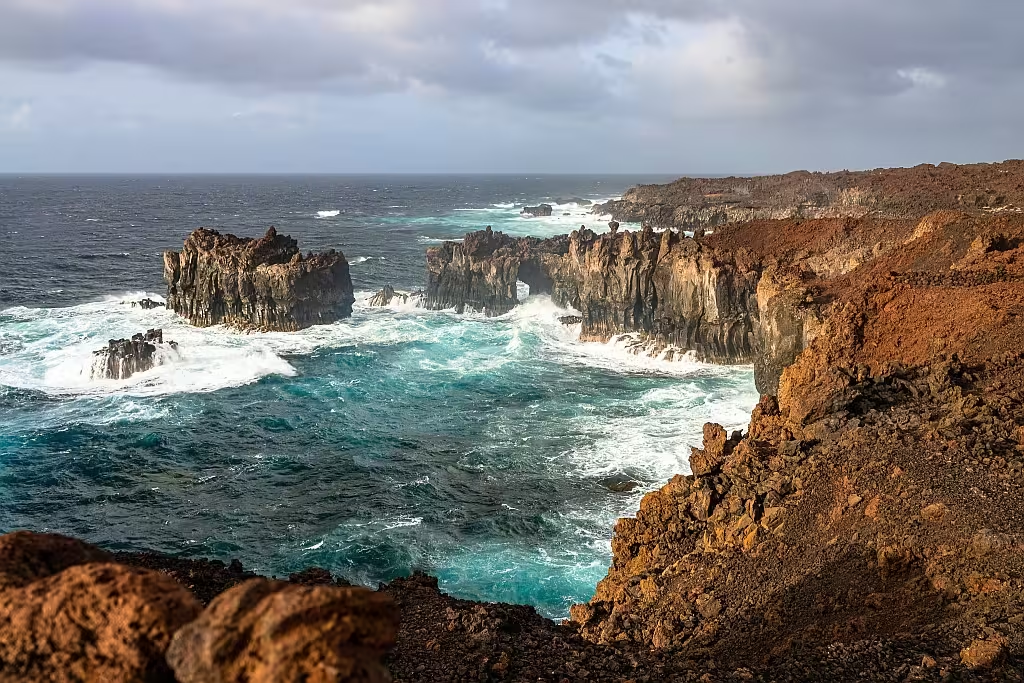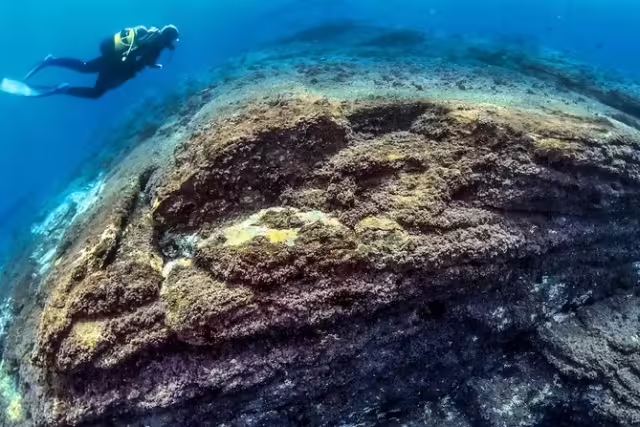While mass tourism transforms the nearby islands, El Hierro—the most westerly and wildest of the Canary Islands—has quietly embraced a different path. This remote island has carved a reputation for its commitment to sustainable tourism, its rugged landscapes, and its distinct charm.
A Geological and Ecological Wonder
El Hierro, a heart-shaped formation off the west coast of Africa, is the youngest and second smallest of the Canary Islands. It emerged from the Atlantic Ocean around 1.2 million years ago, the result of undersea volcanic eruptions. This violent geological history has created a strikingly varied landscape, from fertile valleys and evergreen forests to sky-high cliffs and lunar-like volcanic cones.

Unlike its bustling neighbors, El Hierro is defined by tranquility. The island’s small population of about 11,000, lack of direct international flights, and challenging topography keep mass tourism at bay. In 2023, only around 20,300 visitors came to explore this pristine wilderness, compared to the millions who flocked to Tenerife. As a result, it has retained its wild beauty, with a commitment to ecological integrity.

Diverse Landscapes and Microclimates
El Hierro’s landscape changes as dramatically as its weather. Travelers can journey from the sun-baked southern coast through volcanic badlands to lush, mist-shrouded forests in less than an hour. Its microclimates create environments that range from dense laurel forests to sun-scorched lava fields. Visitors hiking these diverse terrains can encounter everything from towering Canary pines to vibrant red poppies.

The island’s unique geography includes volcanic rock pools, dramatic cliffs, and rare beaches such as the black-pebble Timijiraque, the red sands of Playa del Verodal, and the secluded white-sand Arenas Blancas. However, El Hierro isn’t your typical beach destination; it attracts those seeking adventure rather than leisure.
Outdoor Adventures in El Hierro
Check out the diving and snorkeling activities over at Viator
For active travelers, the island offers approximately 270km of ancient hiking trails that crisscross its diverse landscapes. Whether trekking along the cliffs of El Golfo, wandering through dense forests, climbing volcanic cones, hikers will find plenty to explore.
Water enthusiasts can dive into the Mar de las Calmas Marine Reserve, famous for its world-class diving, or enjoy wild swimming in charcos, the island’s natural volcanic pools.
El Hierro: Discover the Sea Snorkeling Experience.
Paragliding and mountain biking are also popular, thanks to the island’s reliable trade winds and varied terrain.
A visit to La Dehesa brings an encounter with the island’s symbolic “El Sabinar” juniper trees, twisted and shaped over centuries by fierce winds. These ancient trees stand as a testament to the island’s resilience, a theme echoed throughout El Hierro’s culture and history.
El Hierro’s Historical Legacy
Self-sufficiency has always been central to life on El Hierro. The island’s original settlers, the Bimbaches, arrived around 120 CE from North Africa and developed innovative methods to survive on an island without rivers or natural lakes. One of their most ingenious discoveries was the Árbol Garoé, a sacred tree that provided water by collecting moisture from the island’s “horizontal rain.” This phenomenon occurs when the northeast trade winds bring mist, which condenses on vegetation and drips water—a precious resource for early settlers.

The island’s history has been shaped by periodic droughts, which led to mass emigration, most notably to Venezuela in the 20th century. Today, El Hierro’s history can be explored on the Ruta del Agua, a 16km trail that traces the island’s water management systems from ancient wooden tanks to modern dams.
A Commitment to Sustainability
Sustainability isn’t just a buzzword on El Hierro; it’s a way of life. The island is leading the charge for renewable energy in the Canary Islands, with its wind-pumped hydropower station, Gorona del Viento. This innovative system, inaugurated in 2014, uses wind turbines, water reservoirs, and hydraulic turbines to generate enough renewable energy to power the island.

Cultural and Historical Exploration
In addition to its natural wonders, El Hierro offers a glimpse into its rich cultural heritage. Visitors can explore the island’s museums and visitor centers which provides a comprehensive overview of local traditions, geology, and history.
Practical Information for Visitors
How to Get There
El Hierro can be reached by ferry from Los Cristianos in Tenerife or via flights from Tenerife North and Gran Canaria. Check out times and prices at OMIO.
Where to Stay
El Hierro offers a range of accommodations that align with its eco-conscious and tranquil atmosphere. Visitors can find eco-friendly boutique hotels, like the family-run Geko Hotels in Los Llanillos, which provide sustainable, comfortable lodging ideal for exploring the island. Rural casas and cottages are popular, offering charming stays in traditional Canarian architecture, often nestled in quiet villages or scenic natural settings.
For those seeking a more immersive experience, agritourism stays are available, allowing guests to connect with the island’s farming traditions. Additionally, small guesthouses and budget-friendly hostels cater to hikers and adventure travelers, ensuring a variety of options that suit all preferences while preserving the island’s peaceful ambiance.
El Hierro Cuisine: A Blend of Tradition and Local Flavors
El Hierro’s cuisine is a true reflection of its rural heritage, featuring simple yet flavorful dishes made from locally sourced ingredients. The island’s food traditions are deeply connected to its land, influenced by a blend of cultures and historical periods. The result is a rustic, traditional cuisine that highlights the island’s unique character.
Fish holds a prominent place in El Hierro’s diet. It is often prepared fried, stewed, or grilled, and typically served with the famous “papas arrugadas” (crinkled potatoes) accompanied by red or green “mojo” sauce—a classic Canary Islands combination that is hard to resist.
Cheese is another staple of El Hierro’s cuisine, typically made from goat, cow, or sheep’s milk. Many traditional recipes feature cheese, including “caldo de queso” (cheese soup), a dish rooted in the island’s pastoral culture, and “quesadilla,” a beloved cheese and aniseed dessert.
Visitors to El Hierro can also enjoy other Canary Island specialties such as watercress soup, chickpea casserole, and meat and noodle stew. Local delicacies like limpets, escaldón (a thick broth), rabbit, and goat meat also feature prominently in the island’s culinary repertoire.

Where to Eat
In coastal villages like La Restinga, the freshest fish, limpets, and shrimp are readily available, offering a taste of the island’s rich seafood bounty. Throughout the island, you’ll find a mix of traditional and contemporary restaurants, all of which remain true to the island’s culinary identity by using the finest local ingredients.
Since 1994, El Hierro’s wines have been certified with a Designation of Origin, ensuring their quality. The island’s wines, mostly full-bodied whites with distinct character, are often paired with local cheeses. Some producers also create fruity rosés and young reds, bottled shortly after harvest, adding to the diversity of El Hierro’s culinary offerings.
When to Visit
El Hierro Weather: Sunshine and Clear Skies Year-Round
El Hierro enjoys a climate defined by clear skies, minimal rainfall, and abundant sunshine. With mild temperatures ranging from 19°C to 23°C throughout the year, the island offers long, sunny days perfect for outdoor activities and exploration.
Nights on the island are typically clear, making El Hierro a haven for romantics and stargazers. The island’s skies are among the cleanest and brightest in the world, offering exceptional conditions for astronomy enthusiasts to observe the stars.
The Canary Islands benefit from the presence of trade winds, which blow consistently throughout the year due to their proximity to the tropics. These winds, coupled with a thermal inversion effect, prevent cloud formation, ensuring nearly continuous sunshine. Rain is rare, averaging just three days a month, and is almost nonexistent during the summer, making El Hierro a perfect destination for those seeking warm, sunny weather year-round.
A Journey to the Edge of the Known World
El Hierro may feel like the end of the world, and in a sense, it once was. In the 2nd century, Greek astronomer Ptolemy declared that the prime meridian ran through the island’s Orchilla Point. Until Columbus’s voyages, this marked the boundary of the known world. Today, visitors can stand at Faro de Orchilla, the lighthouse at the island’s westernmost point, and gaze out over the Atlantic, experiencing the timeless allure of this remote and wild island.
Further reading.
- The El Hierro tourist board website: https://elhierro.travel/en
- The Mar de Calmas: https://wildsideholidays.co.uk/mar-de-las-calmas-spains-first-marine-national-park/
Ronda Today
Everything you need to know before you visit Ronda “The city of dreams” in Andalucia. https://www.rondatoday.com/
Visit Cádiz
Planning on visiting Cádiz? Tourist information. Monuments. Hotels. Activities. City guides: https://visitingcadiz.com/
The Caminito del Rey
Find tickets for the Caminito del Rey: https://www.caminodelrey.es/
Wildside Holidays – Spain
Take a trip on the Wildside! Discover the wildlife and nature of Spain, its Natural and National Parks and find the top wildlife, activity and walking holiday companies.
Iberia Nature Forum
Struggling with identifying those bugs and beasties? Why not check out the Iberia nature Forum! https://iberianatureforum.com/
I’ve been living in this lovely area of Western Andalucia for the last 20 years or so and dedicate most of my time to the running of English language tourist information websites for the towns of Cádiz, Ronda, Grazalema, the famous or infamous Caminito del Rey, and also Wildside Holidays, which promotes sustainable and eco-friendly businesses running wildlife and walking holidays in Spain. My articles contain affiliate links that will help you reserve a hotel, bus, train or activity in the area. You don’t pay more, but by using them you do support this website. Thankyou!

